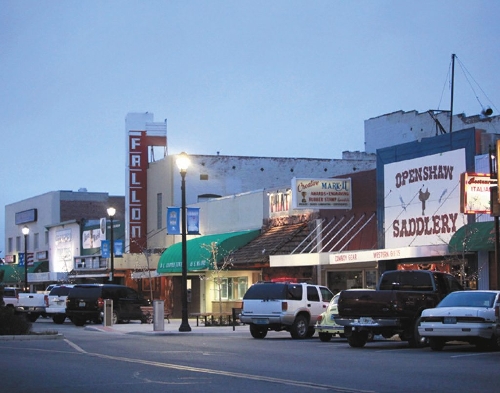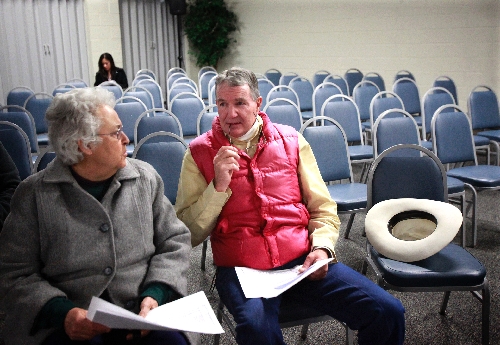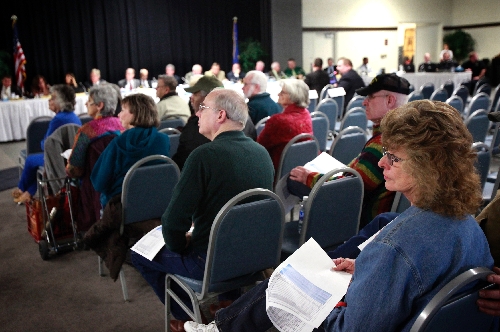Nevada rural voters’ power slips
FALLON -- Assembly Speaker John Oceguera's mother had a piece of advice for her son as the Legislature took its show on the road last week to a farming community known as "the oasis of Nevada."
"I told him to warn everybody about the cows," Eileen Montgomery said. "This is cow country, you know, and you might see one on the roads around here."
"Around here" is Fallon, just 70 miles from the capital, where lawmakers are meeting to try to solve the state's budget problems. Yet the city of 8,606 along America's loneliest highway, in the midst of endless acres of green alfalfa and sweet cantaloupe, seems worlds away from the experience of most lawmakers.
As Nevada's population exploded over the past two decades, the migrating masses flocked to big cities such as Las Vegas, a metropolitan area now 1.9 million strong. The state slowly lost its rural flavor, and the rural areas lost their clout as urban Clark County gained more seats in the Legislature.
"I think people are worried that the rurals are not being represented," Montgomery said. "John grew up here, so he understands."
To hear and better understand, 21 of Nevada's 63 legislators traveled last Thursday to Fallon, where more than 100 people from as far as Ely attended back-to-back sessions on redistricting and education.
Greg Koenig, president of the Churchill County School Board, said the community has cut budgets three years running, and children are suffering.
"We've trimmed the fat. There isn't any fat left," Koenig said, adding that many of the county's school buildings are at least 50 years old and need to be replaced or repaired. "We're using schools that John attended."
Oceguera, D-Las Vegas, born and raised in Fallon, is a fourth-generation Nevadan. His E.C. Best Junior High School class picture still hangs on the wall of the local Pizza Barn, where he worked during high school.
More lawmakers are like Assemblywoman Marilyn Kirkpatrick, D-North Las Vegas, who made her first trip to Fallon only last week. Outside the hearing, she pored over a state map, excited to explore more of Nevada's vast territory.
"I've never been to Elko or Eureka or Carlin. That's where I want to go next. It looks like you can drive there in a day," Kirkpatrick said, an unfolded map spread across a tabletop. "So, yes, maybe I don't understand the rural issues as much as rural lawmakers. That just means I have to work a little harder. In the end, I'm a Nevadan and we're all working hard for everybody in the state."
By the same token, state Sen. James Settelmeyer, R-Minden, a rancher who wears a cowboy hat indoors and out, said it's up to rural lawmakers like himself to educate the city slickers.
"We need to reach out to each other because our issues aren't the same," Settelmeyer said. "They don't know much about tractors, and we don't know much about high-rises. We just have to get them to stop and smell the sagebrush instead of blowing through these towns at 70 miles per hour on their way to someplace else."
Settelmeyer said he plans to do his part and is hoping to organize a Rocky Mountain Oysters barbecue after he brands his cattle this spring. "That'll give them a taste of rural Nevada," he said of the delicacy, deep fried bull testicles.
REDISTRICTING HEARING
The first hourlong hearing focused on redistricting, the redrawing every 10 years of the boundaries of state Senate, Assembly and congressional districts to account for population growth. Nevada hit 2.7 million people in 2010, according to the U.S. Census, which means the state will get a fourth congressional district, likely around Las Vegas.
Because of the population shift south, Northern Nevada stands to lose one more state Senate seat to Clark County, which already has 14 of the 21 total. And Clark County will add one or two more Assembly seats to its current 29 out of a total 42. Expanding the Legislature could save the Northern seats, but there is no major move to do that, partly because adding districts would cost money and also because Democratic leaders from Las Vegas want the extra power.
Assemblyman Pete Goicoechea, R-Eureka, said his district now covers all or part of seven counties, including Churchill, Eureka, Pershing, White Pine, Humboldt, Lander and Washoe. He said the best he can hope for is that his district expands to include even more rural territory to pick up the widely dispersed rural population instead of going deeper into urban Washoe.
"We just have to accept that the North is going to lose some seats," said Goicoechea, the first lawmaker to arrive for the hearing . "This hearing is just a drill. The rurals aren't going to get any more representation out of it. That's just a fact of life. We just don't have the population anymore."
Goicoechea, the GOP minority leader in the Assembly, said there are only three truly rural state Senate districts now and seven Assembly districts if Carson City is included. Less rural representation could mean less protection for state-sponsored or funded services ranging from health care and social work to fire services and community colleges, lawmakers said.
Western Nevada Community College in Fallon serves people from as far away as Austin, a 100-mile plus drive, according to state Sen. Mike McGinness, R-Fallon. There has been speculation that if Gov. Brian Sandoval's suggested budget cuts to higher education stand, satellite university and college facilities could close and there could be a move to shutter rural colleges. The threat of such measures could be used by Democrats to argue for raising taxes, putting pressure on rural Republicans to go along.
"I hate that kind of trade talk," said McGinness, the GOP minority leader in the state Senate. "We need to protect these rural colleges. I think you should fund things on their merits and not get into bargaining like that."
Only four people testified during the redistricting hearing, including a Republican Party official and several older Fallon residents, all concerned that rural Nevada will be ignored if it loses more seats and political power to the South. Another major concern is the 2nd Congressional District, which covers all of Nevada outside Clark County and is a safe rural GOP seat.
"The first concern ... is that rural counties are being realigned into virtual irrelevance," said James Smack, chairman of the Churchill County GOP. He added there's a danger of losing "the integrity of the rural districts."
Rural lawmakers "bring special knowledge" to issues such as water, agriculture, mining and grazing rights, Smack argued.
EDUCATION HEARING
The second hearing centered on education, kindergarten through 12th grade, and drew two dozen speakers and a larger audience worried about proposed deep spending cuts for schools resulting from an anticipated state budget shortfall of $1 billion to $2 billion over two years.
Education is clearly a universal issue for urban and rural Nevadans, said Assemblywoman Debbie Smith, D-Sparks.
Smith has clashed with Sandoval by pushing a bill through the Legislature last week to use money from a $425 million school bond reserve fund to repair and maintain schools.
The measure passed on a party-line vote, with Democrats supporting it and Republicans opposing it. Sandoval said he will veto the bill because it uses $300 million he planned to use to balance his budget.
All of those who testified at the Fallon hearing backed Smith, although they were mostly school leaders, teachers and parents who don't want to see any more cuts to education funding.
"I was amazed at how large the audience was," Smith said. "It's pretty clear they don't want that money taken away."
For example, Sharla Hales of the Douglas County School Board said her district has cut about 10 percent of its $55 million annual budget in the past three fiscal years. She said costs are going up and they can't afford to trim budgets any more.
"The cuts are too drastic," Hales said, echoing other school leaders and teachers who spoke.
By the end of the 90-minute education hearing that ended at 7 p.m., darkness had fallen and another freezing snow storm began to swirl outside. About one-third of the people who attended the hearings at the Fallon Convention Center never took off their winter jackets. They moved quickly to get into their cars and hit U.S. Highway 50 for what would be a long ride home for some.
Dolora Urquhart came to the meeting carrying an oxygen tank, which she used to ease her breathing. She said she dragged herself out of her Fallon house because she wanted lawmakers to know rural Nevadans need attention.
"The reason we moved to Fallon was because it's rural," she said. "I don't want to be lumped in with Las Vegas or Reno. They have no concept of what our needs are."
After the hearing, Oceguera invited lawmakers to the Pizza Barn for a couple of pies and hot chicken wings. And he challenged them to spot him in his junior high school class photo. (He's the tall kid wearing glasses.)
Does he favor adding more seats to protect the rural districts? No, he said, noting that it's Republicans who want to expand the Legislature even as they argue for shrinking the government.
"I think we ought to just keep it the way it is," Oceguera said.
Contact Laura Myers at lmyers@reviewjournal.com or 702-387-2919.
























